
Sustainability Science
Scope & Guideline
Advancing the Dialogue on Sustainable Solutions
Introduction
Aims and Scopes
- Interdisciplinary Research:
The journal focuses on research that integrates knowledge from various disciplines, including environmental science, sociology, economics, and public policy, to address complex sustainability issues. - Stakeholder Engagement:
A core aim is to promote collaboration between researchers, policymakers, practitioners, and communities, ensuring that diverse perspectives are included in sustainability solutions. - Systems Thinking:
The journal emphasizes a systems approach, encouraging research that examines the interconnections and interactions within social-ecological systems. - Transformative Change:
Research published in the journal aims to identify pathways for transformative change towards more sustainable practices and policies across different sectors. - Social Justice and Equity:
A consistent focus on the social dimensions of sustainability, the journal explores themes of equity, justice, and inclusivity in sustainability transitions. - Empirical Studies and Case Analyses:
The journal values empirical research and case studies that provide real-world insights into sustainability practices and challenges.
Trending and Emerging
- Transdisciplinary Approaches:
There is a growing emphasis on transdisciplinary research that combines academic knowledge with practical insights from communities and stakeholders, leading to more effective sustainability solutions. - Climate Justice and Equity:
Research exploring the intersection of climate change, social justice, and equity is on the rise, reflecting an increasing recognition of the need for inclusive approaches to sustainability. - Behavioral Insights and Social Change:
Emerging themes focus on understanding human behavior and its role in sustainability transitions, emphasizing the importance of social dynamics in driving change. - Nature-Based Solutions:
There is a notable trend towards exploring nature-based solutions for addressing sustainability challenges, including climate adaptation and mitigation strategies. - Systems Resilience and Adaptation:
Research centered on resilience and adaptation strategies within social-ecological systems is gaining attention, highlighting the need for flexibility and responsiveness in sustainability efforts. - Digital Innovations and Sustainability:
The integration of digital technologies and data analytics in sustainability research is emerging as a significant theme, offering new tools and methodologies for addressing complex problems.
Declining or Waning
- Traditional Environmental Management:
There is a noticeable decline in papers focusing solely on traditional environmental management approaches, as the journal shifts towards more integrated and systemic perspectives. - Purely Theoretical Frameworks:
Research that relies heavily on theoretical frameworks without empirical validation is becoming less common, as the journal increasingly values empirical evidence and case studies. - Sector-Specific Studies:
There is a waning interest in studies that focus narrowly on specific sectors (e.g., agriculture, forestry) without considering their interconnections with other sectors and systems. - Single-Dimensional Assessments:
Research that offers single-dimensional assessments of sustainability issues, such as solely environmental or economic analyses, is less favored compared to multi-dimensional approaches. - Focus on Local Contexts Only:
Papers that discuss sustainability challenges in isolation from global contexts or broader systems are becoming less prevalent, as there is a push for more holistic views.
Similar Journals

Present Environment and Sustainable Development
Empowering interdisciplinary dialogue for a greener future.Present Environment and Sustainable Development, published by ALEXANDRU IOAN CUZA UNIVERSITY PRESS, is a prominent open-access journal dedicated to advancing knowledge in the field of environmental science and sustainable development. Since its inception in 2014, the journal has provided a platform for researchers, professionals, and students to disseminate transformative ideas and innovative research aimed at addressing crucial environmental challenges. With its ISSN 1843-5971 and E-ISSN 2284-7820, it emphasizes the necessity of sustainable practices in contemporary society, facilitating interdisciplinary approaches that unite various fields, including ecology, policy, and socio-economic studies. Based in Iasi, Romania, this journal plays a vital role in fostering international collaboration and dialogue on sustainability, making it an essential resource for anyone committed to understanding and improving the environment for future generations.
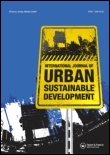
International Journal of Urban Sustainable Development
Transforming cities for a sustainable tomorrow.The International Journal of Urban Sustainable Development is a premier peer-reviewed journal published by Taylor & Francis Ltd, dedicated to advancing knowledge in the field of urban sustainability. With an ISSN of 1946-3138 and an E-ISSN of 1946-3146, this journal has gained recognition for its high-quality research, attaining Q1 status in multiple categories including Development, Geography, Planning and Development, and Urban Studies, per the 2023 category quartiles. Open Access since 2022, the journal ensures that groundbreaking research is widely accessible to scholars, practitioners, and policy-makers alike, enhancing its reach and impact. Operating from the United Kingdom, it focuses on a diverse array of topics related to urban environments and sustainable practices, supporting innovation and policy development. As a result, the journal holds significant placements in Scopus rankings, notably ranking #62 in Urban Studies, underscoring its pivotal role in shaping the future of sustainable urban development globally.
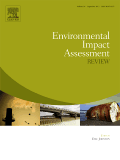
Environmental Impact Assessment Review
Navigating the complexities of environmental assessment.The Environmental Impact Assessment Review is a premier academic journal published by Elsevier Science Inc, specializing in the critical field of environmental studies. Established in 1980, this journal serves as a vital platform for disseminating research on the assessment and management of environmental impacts, encompassing a broad range of topics within ecology, geography, and environmental policy. With a distinguished Q1 ranking in multiple categories, including Ecology and Management, Monitoring, Policy and Law in 2023, it positions itself among the top-tier journals, fostering high-impact discussions that influence practice and policy globally. The review features rigorous peer-reviewed articles, case studies, and review papers, making it invaluable for researchers, practitioners, and policymakers seeking to advance their understanding of environmental challenges. Although it operates under a subscription model, the journal is committed to facilitating access to quality research and its insights, promoting an informed dialogue among the scientific community. With an impressive Scopus ranking and a strong citation impact, Environmental Impact Assessment Review remains pivotal in shaping the future of environmental assessment methodologies.

disP
Innovating Solutions for Complex Planning ChallengesdisP is a premier journal dedicated to the interdisciplinary field of geographical planning and development, published by Routledge Journals, Taylor & Francis Ltd. With a focus spanning from 1980 to 2024, this esteemed publication serves as a crucial platform for sharing innovative research and insights that address pressing spatial challenges and planning methodologies. The journal is recognized for its significant contribution to academia, currently positioned in the Q2 category within Geography, Planning and Development according to the 2023 rankings. It occupies a noteworthy rank of #423 out of 821 in the Scopus database, placing it in the 48th percentile for social sciences within its category. Although it does not offer open access, disP remains an essential source for scholars, practitioners, and policymakers seeking to deepen their understanding of complex development issues and spatial strategies. Its commitment to excellence in research ensures that disP continues to be an influential voice in shaping the future of geographical planning and development.
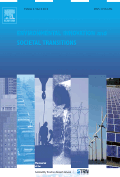
Environmental Innovation and Societal Transitions
Leading the Charge in Environmental Science and Social InnovationEnvironmental Innovation and Societal Transitions, published by ELSEVIER, stands as a leading academic journal in the fields of Environmental Science, Renewable Energy, and Social Sciences. With an impressive impact factor and ranking in the 98th percentile in Social Sciences and 96th percentile in Environmental Science, this journal is recognized for its rigorous peer-reviewed articles that contribute significantly to the discourse on sustainability and technological advancements. Established in 2011, it embodies the dynamic interplay between environmental innovation and societal adaptation, making it crucial for researchers, professionals, and students dedicated to understanding and shaping sustainable futures. The journal's commitment to high-quality research is evidenced by its placement in the Q1 category across multiple disciplines, asserting its pivotal role in advancing knowledge and practical solutions in these critical areas of study.
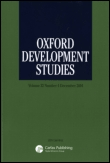
Oxford Development Studies
Navigating Contemporary Development Challenges with Scholarly Rigor.Oxford Development Studies, published by Routledge Journals, Taylor & Francis Ltd, is a premier academic journal that delves into the dynamic fields of development studies and geography, offering valuable insights and innovative research. With an ISSN of 1360-0818 and an E-ISSN of 1469-9966, the journal has achieved a significant status, being ranked in the Q2 category for both Development and Geography, Planning and Development in 2023. Spanning over several decades, from 1996 to 2024, it provides a critical platform for scholars, practitioners, and students to engage with contemporary issues and policy debates that shape the global development landscape. Notably, it holds a position within the 59th percentile of Scopus rankings for its categories, indicating its substantial influence and contribution to the field. Although it does not currently offer open access, the journal remains accessible to a wide audience through institutional subscriptions. Engaging with the content of Oxford Development Studies is essential for those looking to explore the nexus of research, practice, and policy in development.

Global Sustainability
Empowering Research for a Sustainable FutureGlobal Sustainability, published by Cambridge University Press, serves as a pivotal platform for interdisciplinary research in the realms of sustainability, management, and environmental policy. Since its establishment as an Open Access journal in 2018, it has empowered researchers, professionals, and students by ensuring that high-quality research is widely accessible. With an impressive impact factor reflected in its Q1 category rankings in both Global and Planetary Change and Management, Monitoring, Policy and Law, this journal is at the forefront of advancing knowledge and strategies crucial for sustainable development. Operating from its headquarters in Cambridge, United Kingdom, this journal not only influences academic discourse but also plays a significant role in shaping public policy and practices towards a more sustainable world. Researchers are encouraged to submit innovative contributions as the journal continues to converge impactful scholarship from 2018 to 2024 and beyond.
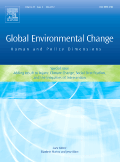
GLOBAL ENVIRONMENTAL CHANGE-HUMAN AND POLICY DIMENSIONS
Fostering Interdisciplinary Dialogue for Global SolutionsGLOBAL ENVIRONMENTAL CHANGE-HUMAN AND POLICY DIMENSIONS is a premier academic journal published by Elsevier Science Ltd, based in the United Kingdom. With a significant focus on the interplay between human activities and environmental change, this journal serves as a critical platform for researchers and policymakers alike. It boasts an impressive impact factor and ranks in the top quartile (Q1) across multiple categories, including Ecology, Geography, and Environmental Science, reflecting its high relevance and influence within the respective fields. The journal provides insightful analyses and empirical studies from 1990 to 2024, fostering a deeper understanding of the socio-political dimensions of global environmental issues. Although it does not offer open access options, readers can still access the journal through various university libraries and institutional subscriptions, ensuring wide dissemination of important research findings. With its dedication to promoting interdisciplinary dialogue and evidence-based policy development, GLOBAL ENVIRONMENTAL CHANGE remains an invaluable resource for academics, practitioners, and students committed to addressing pressing environmental challenges.
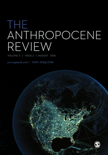
Anthropocene Review
Navigating the Complexities of Human-Environment InteractionsAnthropocene Review is a prominent academic journal published by SAGE Publications Inc. that focuses on the interdisciplinary study of the Anthropocene—a term used to describe the significant global changes resulting from human activity. Launched in 2014 and forming part of its converged years until 2024, this journal has quickly established itself as an essential resource for researchers and professionals in the fields of Ecology, Geology, and Global and Planetary Change, as evidenced by its notable Q2 and Q3 rankings in these categories. With a solid Scopus ranking placing it within the top tiers of Earth and Planetary Sciences and Environmental Science disciplines, the Anthropocene Review aims to shed light on the complex interactions between human actions and the environment, fostering a deeper understanding of sustainability and ecological impacts. While currently not an open-access journal, it provides crucial research findings and theoretical advancements that appeal to students and academics alike, shaping the discourse on our planet's future.

Problemy Ekorozwoju
Navigating the Challenges of Ecological DevelopmentProblemy Ekorozwoju is a leading journal dedicated to the interdisciplinary fields of geography, management, and environmental sustainability, published by Politechnika Lubelska in Poland. With its ISSN 1895-6912 and E-ISSN 2080-1971, this journal serves as a vital platform for disseminating high-quality research that addresses contemporary challenges in sustainable development and ecological progress. As of 2023, it holds a commendable position in the Q3 quartile for categories including Geography, Planning and Development, Management, Monitoring, Policy and Law, and Renewable Energy, Sustainability, and the Environment. Researchers and professionals in these fields can benefit from the journal’s commitment to rigorous peer review and open exchange of knowledge. With coverage spanning from 2008 to 2024, Problemy Ekorozwoju is vital for those aiming to explore innovative solutions and policy frameworks that promote environmental stewardship and sustainable practices across various sectors.